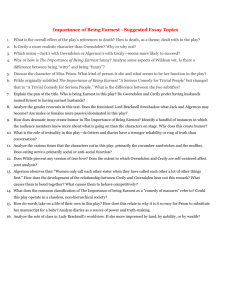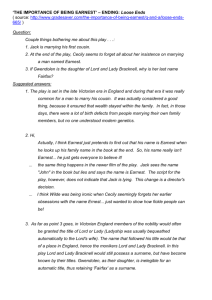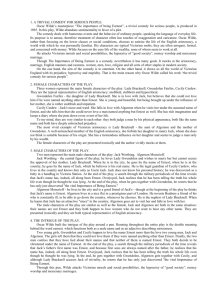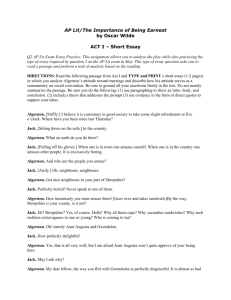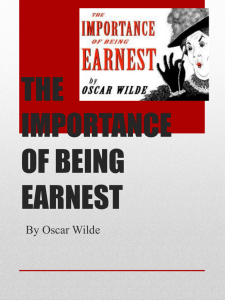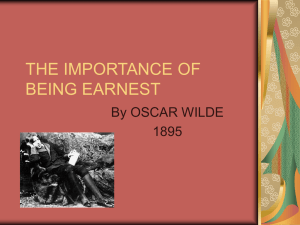The Importance of Being Earnest PRE
advertisement
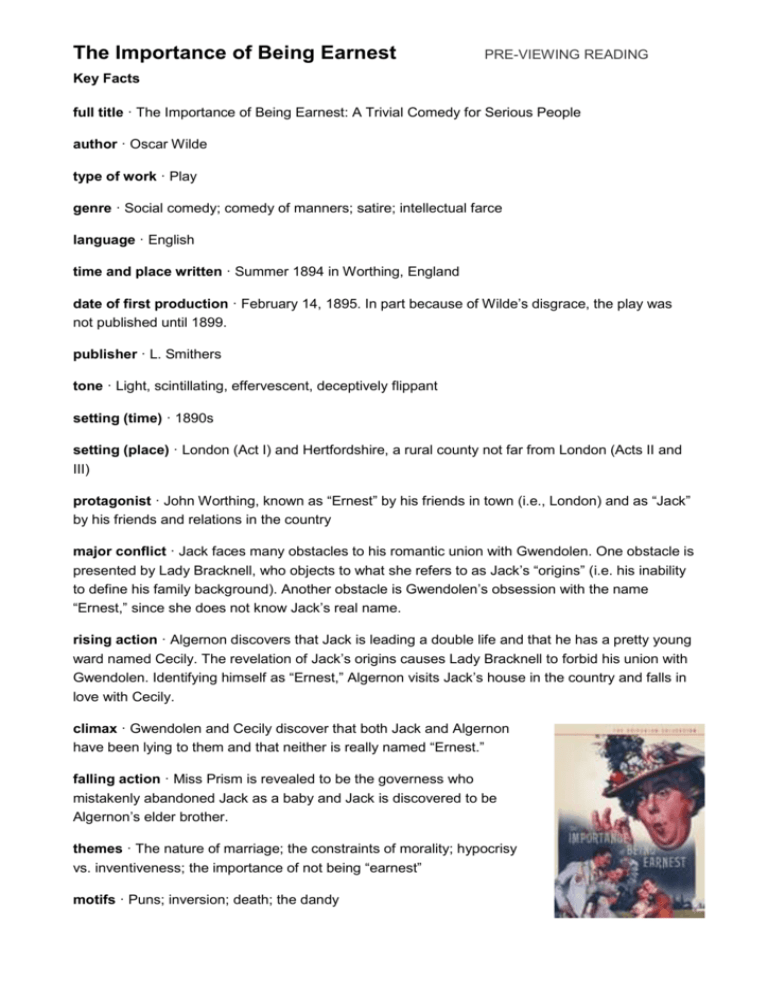
The Importance of Being Earnest PRE-VIEWING READING Key Facts full title · The Importance of Being Earnest: A Trivial Comedy for Serious People author · Oscar Wilde type of work · Play genre · Social comedy; comedy of manners; satire; intellectual farce language · English time and place written · Summer 1894 in Worthing, England date of first production · February 14, 1895. In part because of Wilde’s disgrace, the play was not published until 1899. publisher · L. Smithers tone · Light, scintillating, effervescent, deceptively flippant setting (time) · 1890s setting (place) · London (Act I) and Hertfordshire, a rural county not far from London (Acts II and III) protagonist · John Worthing, known as “Ernest” by his friends in town (i.e., London) and as “Jack” by his friends and relations in the country major conflict · Jack faces many obstacles to his romantic union with Gwendolen. One obstacle is presented by Lady Bracknell, who objects to what she refers to as Jack’s “origins” (i.e. his inability to define his family background). Another obstacle is Gwendolen’s obsession with the name “Ernest,” since she does not know Jack’s real name. rising action · Algernon discovers that Jack is leading a double life and that he has a pretty young ward named Cecily. The revelation of Jack’s origins causes Lady Bracknell to forbid his union with Gwendolen. Identifying himself as “Ernest,” Algernon visits Jack’s house in the country and falls in love with Cecily. climax · Gwendolen and Cecily discover that both Jack and Algernon have been lying to them and that neither is really named “Ernest.” falling action · Miss Prism is revealed to be the governess who mistakenly abandoned Jack as a baby and Jack is discovered to be Algernon’s elder brother. themes · The nature of marriage; the constraints of morality; hypocrisy vs. inventiveness; the importance of not being “earnest” motifs · Puns; inversion; death; the dandy The Importance of Being Earnest PRE-VIEWING READING symbols · The double life; food; fiction and writing foreshadowing · In stage comedy and domestic melodrama, foreshadowing often takes the form of objects, ideas, or plot points whose very existence in the play signals to the audience that they will come up again. The fact that Jack was adopted as a baby, for instance, predicates a recognition scene in which Jack’s true identity is revealed and the plot is resolved by means of some incredible coincidence. Miss Prism’s “three-volume novel” is another example: Her very mention of it ensures that it will be important later. An instance of foreshadowing that operates in the more usual way is Jack’s assertion that Cecily and Gwendolen will be “calling each other sister” within half an hour of having met, followed by Algernon’s that “[w]omen only do that when they have called each other a lot of other things first.” This is literally what happens between Cecily and Gwendolen in Act II. Character List John (Jack/Ernest) Worthing, J.P. - The play’s protagonist. Jack Worthing is a seemingly responsible and respectable young man who leads a double life. In Hertfordshire, where he has a country estate, Jack is known as Jack. In London he is known as Ernest. As a baby, Jack was discovered in a handbag in the cloakroom of Victoria Station by an old man who adopted him and subsequently made Jack guardian to his granddaughter, Cecily Cardew. Jack is in love with his friend Algernon’s cousin, Gwendolen Fairfax. The initials after his name indicate that he is a Justice of the Peace. Algernon Moncrieff - The play’s secondary hero. Algernon is a charming, idle, decorative bachelor, nephew of Lady Bracknell, cousin of Gwendolen Fairfax, and best friend of Jack Worthing, whom he has known for years as Ernest. Algernon is brilliant, witty, selfish, amoral, and given to making delightful paradoxical and epigrammatic pronouncements. He has invented a fictional friend, “Bunbury,” an invalid whose frequent sudden relapses allow Algernon to wriggle out of unpleasant or dull social obligations. Gwendolen Fairfax - Algernon’s cousin and Lady Bracknell’s daughter. Gwendolen is in love with Jack, whom she knows as Ernest. A model and arbiter of high fashion and society, Gwendolen speaks with unassailable authority on matters of taste and morality. She is sophisticated, intellectual, cosmopolitan, and utterly pretentious. Gwendolen is fixated on the name Ernest and says she will not marry a man without that name. Cecily Cardew - Jack’s ward, the granddaughter of the old gentlemen who found and adopted Jack when Jack was a baby. Cecily is probably the most realistically drawn character in the play. Like Gwendolen, she is obsessed with the name Ernest, but she is even more intrigued by the idea of wickedness. This idea, rather than the virtuous-sounding name, has prompted her to fall in love The Importance of Being Earnest PRE-VIEWING READING with Jack’s brother Ernest in her imagination and to invent an elaborate romance and courtship between them. Lady Bracknell - Algernon’s snobbish, mercenary, and domineering aunt and Gwendolen’s mother. Lady Bracknell married well, and her primary goal in life is to see her daughter do the same. She has a list of “eligible young men” and a prepared interview she gives to potential suitors. Like her nephew, Lady Bracknell is given to making hilarious pronouncements, but where Algernon means to be witty, the humor in Lady Bracknell’s speeches is unintentional. Through the figure of Lady Bracknell, Wilde manages to satirize the hypocrisy and stupidity of the British aristocracy. Lady Bracknell values ignorance, which she sees as “a delicate exotic fruit.” When she gives a dinner party, she prefers her husband to eat downstairs with the servants. She is cunning, narrow-minded, authoritarian, and possibly the most quotable character in the play. Miss Prism - Cecily’s governess. Miss Prism is an endless source of pedantic bromides and clichés. She highly approves of Jack’s presumed respectability and harshly criticizes his “unfortunate” brother. Puritan though she is, Miss Prism’s severe pronouncements have a way of going so far over the top that they inspire laughter. Despite her rigidity, Miss Prism seems to have a softer side. She speaks of having once written a novel whose manuscript was “lost” or “abandoned.” Also, she entertains romantic feelings for Dr. Chasuble. Rev. Canon Chasuble, D.D. - The rector on Jack’s estate. Both Jack and Algernon approach Dr. Chasuble to request that they be christened “Ernest.” Dr. Chasuble entertains secret romantic feelings for Miss Prism. The initials after his name stand for “Doctor of Divinity.” Lane - Algernon’s manservant. When the play opens, Lane is the only person who knows about Algernon’s practice of “Bunburying.” Lane appears only in Act I. Merriman - The butler at the Manor House, Jack’s estate in the country. Merriman appears only in Acts II and III. Plot Overview Jack Worthing, the play’s protagonist, is a pillar of the community in Hertfordshire, where he is guardian to Cecily Cardew, the pretty, eighteen-year-old granddaughter of the late Thomas Cardew, who found and adopted Jack when he was a baby. In Hertfordshire, Jack has responsibilities: he is a major landowner and justice of the peace, with tenants, farmers, and a number of servants and other employees all dependent on him. For years, he has also pretended to have an irresponsible black-sheep brother named Ernest who leads a scandalous life in pursuit of pleasure and is always getting into trouble of a sort that requires Jack to rush grimly off to his assistance. In fact, Ernest is merely Jack’s alibi, a phantom that allows him to disappear for days at a time and do as he likes. No one but Jack knows that he himself is Ernest. Ernest is the name Jack goes by in London, which is where he really goes on these The Importance of Being Earnest PRE-VIEWING READING occasions—probably to pursue the very sort of behavior he pretends to disapprove of in his imaginary brother. Jack is in love with Gwendolen Fairfax, the cousin of his best friend, Algernon Moncrieff. When the play opens, Algernon, who knows Jack as Ernest, has begun to suspect something, having found an inscription inside Jack’s cigarette case addressed to “Uncle Jack” from someone who refers to herself as “little Cecily.” Algernon suspects that Jack may be leading a double life, a practice he seems to regard as commonplace and indispensable to modern life. He calls a person who leads a double life a “Bunburyist,” after a nonexistent friend he pretends to have, a chronic invalid named Bunbury, to whose deathbed he is forever being summoned whenever he wants to get out of some tiresome social obligation. At the beginning of Act I, Jack drops in unexpectedly on Algernon and announces that he intends to propose to Gwendolen. Algernon confronts him with the cigarette case and forces him to come clean, demanding to know who “Jack” and “Cecily” are. Jack confesses that his name isn’t really Ernest and that Cecily is his ward, a responsibility imposed on him by his adoptive father’s will. Jack also tells Algernon about his fictional brother. Jack says he’s been thinking of killing off this fake brother, since Cecily has been showing too active an interest in him. Without meaning to, Jack describes Cecily in terms that catch Algernon’s attention and make him even more interested in her than he is already. Gwendolen and her mother, Lady Bracknell, arrive, which gives Jack an opportunity to propose to Gwendolen. Jack is delighted to discover that Gwendolen returns his affections, but he is alarmed to learn that Gwendolen is fixated on the name Ernest, which she says “inspires absolute confidence.” Gwendolen makes clear that she would not consider marrying a man who was not named Ernest. Lady Bracknell interviews Jack to determine his eligibility as a possible son-in-law, and during this interview she asks about his family background. When Jack explains that he has no idea who his parents were and that he was found, by the man who adopted him, in a handbag in the cloakroom at Victoria Station, Lady Bracknell is scandalized. She forbids the match between Jack and Gwendolen and sweeps out of the house. In Act II, Algernon shows up at Jack’s country estate posing as Jack’s brother Ernest. Meanwhile, Jack, having decided that Ernest has outlived his usefulness, arrives home in deep mourning, full of a story about Ernest having died suddenly in Paris. He is enraged to find Algernon there masquerading as Ernest but has to go along with the charade. If he doesn’t, his own lies and deceptions will be revealed. While Jack changes out of his mourning clothes, Algernon, who has fallen hopelessly in love with Cecily, asks her to marry him. He is surprised to discover that Cecily already considers that they are engaged, and he is charmed when she reveals that her fascination with “Uncle Jack’s brother” led her to invent an elaborate romance between herself and him several months ago. Algernon is less enchanted to learn that part of Cecily’s interest in him derives from the name Ernest, which, unconsciously echoing Gwendolen, she says “inspires absolute confidence.” The Importance of Being Earnest PRE-VIEWING READING Algernon goes off in search of Dr. Chasuble, the local rector, to see about getting himself christened Ernest. Meanwhile, Gwendolen arrives, having decided to pay Jack an unexpected visit. Gwendolen is shown into the garden, where Cecily orders tea and attempts to play hostess. Cecily has no idea how Gwendolen figures into Jack’s life, and Gwendolen, for her part, has no idea who Cecily is. Gwendolen initially thinks Cecily is a visitor to the Manor House and is disconcerted to learn that Cecily is “Mr. Worthing’s ward.” She notes that Ernest has never mentioned having a ward, and Cecily explains that it is not Ernest Worthing who is her guardian but his brother Jack and, in fact, that she is engaged to be married to Ernest Worthing. Gwendolen points out that this is impossible as she herself is engaged to Ernest Worthing. The tea party degenerates into a war of manners. Jack and Algernon arrive toward the climax of this confrontation, each having separately made arrangements with Dr. Chasuble to be christened Ernest later that day. Each of the young ladies points out that the other has been deceived: Cecily informs Gwendolen that her fiancé is really named Jack and Gwendolen informs Cecily that hers is really called Algernon. The two women demand to know where Jack’s brother Ernest is, since both of them are engaged to be married to him. Jack is forced to admit that he has no brother and that Ernest is a complete fiction. Both women are shocked and furious, and they retire to the house arm in arm. Act III takes place in the drawing room of the Manor House, where Cecily and Gwendolen have retired. When Jack and Algernon enter from the garden, the two women confront them. Cecily asks Algernon why he pretended to be her guardian’s brother. Algernon tells her he did it in order to meet her. Gwendolen asks Jack whether he pretended to have a brother in order to come into London to see her as often as possible, and she interprets his evasive reply as an affirmation. The women are somewhat appeased but still concerned over the issue of the name. However, when Jack and Algernon tell Gwendolen and Cecily that they have both made arrangements to be christened Ernest that afternoon, all is forgiven and the two pairs of lovers embrace. At this moment, Lady Bracknell’s arrival is announced. Lady Bracknell has followed Gwendolen from London, having bribed Gwendolen’s maid to reveal her destination. She demands to know what is going on. Gwendolen again informs Lady Bracknell of her engagement to Jack, and Lady Bracknell reiterates that a union between them is out of the question. Algernon tells Lady Bracknell of his engagement to Cecily, prompting her to inspect Cecily and inquire into her social connections, which she does in a routine and patronizing manner that infuriates Jack. He replies to all her questions with a mixture of civility and sarcasm, withholding until the last possible moment the information that Cecily is actually worth a great deal of money and stands to inherit still more when she comes of age. At this, Lady Bracknell becomes genuinely interested. Jack informs Lady Bracknell that, as Cecily’s legal guardian, he refuses to give his consent to her union with Algernon. Lady Bracknell suggests that the two young people simply wait until Cecily comes of age, and Jack points out that under the terms of her grandfather’s will, Cecily does not legally come of age until she is thirty-five. Lady Bracknell asks Jack to reconsider, and he points out that the matter is entirely in her own hands. As soon as she consents to his marriage to Gwendolen, Cecily can have his consent to marry Algernon. However, Lady Bracknell refuses to entertain the notion. She and Gwendolen are on the point of leaving when Dr. Chasuble arrives The Importance of Being Earnest PRE-VIEWING READING and happens to mention Cecily’s governess, Miss Prism. At this, Lady Bracknell starts and asks that Miss Prism be sent for. When the governess arrives and catches sight of Lady Bracknell, she begins to look guilty and furtive. Lady Bracknell accuses her of having left her sister’s house twenty-eight years before with a baby and never returned. She demands to know where the baby is. Miss Prism confesses she doesn’t know, explaining that she lost the baby, having absentmindedly placed it in a handbag in which she had meant to place the manuscript for a novel she had written. Jack asks what happened to the bag, and Miss Prism says she left it in the cloakroom of a railway station. Jack presses her for further details and goes racing offstage, returning a few moments later with a large handbag. When Miss Prism confirms that the bag is hers, Jack throws himself on her with a cry of “Mother!” It takes a while before the situation is sorted out, but before too long we understand that Jack is not the illegitimate child of Miss Prism but the legitimate child of Lady Bracknell’s sister and, therefore, Algernon’s older brother. Furthermore, Jack had been originally christened “Ernest John.” All these years Jack has unwittingly been telling the truth: Ernest is his name, as is Jack, and he does have an unprincipled younger brother—Algernon. Again the couples embrace, Miss Prism and Dr. Chasuble follow suit, and Jack acknowledges that he now understands “the vital Importance of Being Earnest.” Themes, Motifs, and Symbols Themes Themes are the fundamental and often universal ideas explored in a literary work. The Nature of Marriage Marriage is of paramount importance in The Importance of Being Earnest, both as a primary force motivating the plot and as a subject for philosophical speculation and debate. The question of the nature of marriage appears for the first time in the opening dialogue between Algernon and his butler, Lane, and from this point on the subject never disappears for very long. Algernon and Jack discuss the nature of marriage when they dispute briefly about whether a marriage proposal is a matter of “business” or “pleasure,” and Lady Bracknell touches on the issue when she states, “An engagement should come on a young girl as a surprise, pleasant or unpleasant, as the case may be.” Even Lady Bracknell’s list of bachelors and the prepared interview to which she subjects Jack are based on a set of assumptions about the nature and purpose of marriage. In general, these assumptions reflect the conventional preoccupations of Victorian respectability—social position, income, and character. The play is actually an ongoing debate about the nature of marriage and whether it is “pleasant or unpleasant.” Lane remarks casually that he believes it to be “a very pleasant state,” before admitting that his own marriage, now presumably ended, was the result of “a misunderstanding between myself and a young person.” Algernon regards Lane’s views on marriage as “somewhat The Importance of Being Earnest PRE-VIEWING READING lax.” His own views are relentlessly cynical until he meets and falls in love with Cecily. Jack, by contrast, speaks in the voice of the true romantic. He tells Algernon, however, that the truth “isn’t quite the sort of thing one tells to a nice, sweet, refined girl.” At the end of the play, Jack apologizes to Gwendolen when he realizes he had been telling the truth all his life. She forgives him, she says, on the grounds that she thinks he’s sure to change, which suggests Gwendolen’s own rather cynical view of the nature of men and marriage. The Importance of Not Being “Earnest” Earnestness, which implies seriousness or sincerity, is the great enemy of morality in The Importance of Being Earnest. Earnestness can take many forms, including boringness, solemnity, pomposity, complacency, smugness, self-righteousness, and sense of duty, all of which Wilde saw as hallmarks of the Victorian character. When characters in the play use the word serious, they tend to mean “trivial,” and vice versa. For example, Algernon thinks it “shallow” for people not to be “serious” about meals, and Gwendolen believes, “In matters of grave importance, style, not sincerity is the vital thing.” For Wilde, the word earnest comprised two different but related ideas: the notion of false truth and the notion of false morality, or moralism. The moralism of Victorian society—its smugness and pomposity—impels Algernon and Jack to invent fictitious alter egos so as to be able to escape the strictures of propriety and decency. However, what one member of society considers decent or indecent doesn’t always reflect what decency really is. One of the play’s paradoxes is the impossibility of actually being either earnest (meaning “serious” or “sincere”) or moral while claiming to be so. The characters who embrace triviality and wickedness are the ones who may have the greatest chance of attaining seriousness and virtue. Symbols Symbols are objects, characters, figures, or colors used to represent abstract ideas or concepts. The Double Life The double life is the central metaphor in the play, epitomized in the notion of “Bunbury” or “Bunburying.” As defined by Algernon, Bunburying is the practice of creating an elaborate deception that allows one to misbehave while seeming to uphold the very highest standards of duty and responsibility. Jack’s imaginary, wayward brother Ernest is a device not only for escaping social and moral obligations but also one that allows Jack to appear far more moral and responsible than he actually is. Similarly, Algernon’s imaginary invalid friend Bunbury allows Algernon to escape to the country, where he presumably imposes on people who don’t know him in much the same way he imposes on Cecily in the play, all the while seeming to demonstrate Christian charity. The practice of visiting the poor and the sick was a staple activity among the Victorian upper and upper-middle classes and considered a public duty. The difference between what Jack does and what Algernon does, however, is that Jack not only pretends to be something he is not, that is, completely virtuous, but also routinely pretends to be someone he is not, which is very different. This sort of deception suggests a far more serious and profound degree of hypocrisy. Through these various enactments of double lives, Wilde suggests the general hypocrisy of the Victorian mindset. The Importance of Being Earnest PRE-VIEWING READING Food Food and scenes of eating appear frequently in The Importance of Being Earnest, and they are almost always sources of conflict. Act I contains the extended cucumber sandwich joke, in which Algernon, without realizing it, steadily devours all the sandwiches. In Act II, the climax of Gwendolen and Cecily’s spat over who is really engaged to Ernest Worthing comes when Gwendolen tells Cecily, who has just offered her sugar and cake, that sugar is “not fashionable any more” and “Cake is rarely seen at the best houses nowadays.” Cecily responds by filling Gwendolen’s tea with sugar and her plate with cake. The two women have actually been insulting each other quite steadily for some time, but Cecily’s impudent actions cause Gwendolen to become even angrier, and she warns Cecily that she “may go too far.” On one level, the jokes about food provide a sort of low comedy, the Wildean equivalent of the slammed door or the pratfall. On another level, food seems to be a stand-in for sex, as when Jack tucks into the bread and butter with too much gusto and Algernon accuses him of behaving as though he were already married to Gwendolen. Food and gluttony suggest and substitute for other appetites and indulgences. REVIEW NZ Herald TUESDAY MARCH 9, 2010 What: The Importance of Being Earnest Where and when: Maidment Theatre, March 11-April 3 Adam Gardiner, Lisa Chappell and Elizabeth Hawthorne. Three years ago, Ash Jones sat in the audience as an Auckland Theatre Company ambassador - a select group of young people who see shows for free, participate in workshops and discussion forums and promote the plays among their peers. Now the former Maclean's College student has a lead role in Oscar Wilde's The Importance of Being Earnest, his biggest role to date and the first time he has performed with ATC. Jones, 20, plays the raffish Algernon Moncrieff alongside a skilled cast that includes Elizabeth Hawthorne as Lady Bracknell, Lisa Chappell as Gwendolen Fairfax and Adam Gardiner as Jack Worthing. As one would expect, the young Jones describes it as a privilege to work with such an experienced cast and director Colin McColl, which prompts a dramatic snort of mock derision from actor Cameron Rhodes. Fresh from directing contemporary comedy I Heart Camping, Rhodes plays the Rev Canon Chasuble D.D, but 20 years ago he played Algernon at Wellington's Downstage. The Importance of Being Earnest PRE-VIEWING READING "Colin was directing. He was so tough on me that I ended up locking myself in the toilet. Robyn Malcolm [now famous as TV's Cheryl West] had to come and get me out." No, says Jones, nothing similar has happened to him and it's all been a valuable and important theatre education, particularly discussing Wilde's satire and the social mores and morality of his day. Not that McColl is setting the story in London in 1895, when Earnest premiered at the St James Theatre. "Instead he has drawn on a diverse range of sources, from Lady Gaga to the Beatles, to create a contemporary world where the aristocracy behave badly. The story and Wilde's script - punctuated with puns, witticisms and cutting comments - remains the same. Jack Worthing wants to marry Gwendolen Fairfax, daughter of the redoubtable Lady Bracknell and cousin of his feckless friend Algernon. But marriage is out of the question until Lady Bracknell determines Worthing comes from the "right stock". Considering he was found as a baby in a handbag at Victoria Station, his prospects are not looking hopeful. Worthing's battle for Gwendolen's hand is further complicated by Algernon's growing attraction to his pretty young ward Cecily (Laurel Devenie) and by the fact that secrets and lies have a powerful hold over both men. Wilde may have scoffed at a society he believed prized the superficial over the profound, but McColl firmly believes it is a case of the more things change, the more they stay the same. Aristocrats and the moneyed classes behave just as outrageously as ever, he says. You only have to pick up weekly gossip magazines, flick on TV or, more likely, switch on your computer to see the evidence. "We're talking about the type of people who really don't have to worry about morality or money - just look at young royals like Prince Harry falling drunk out of nightclubs or Lord Freddie Windsor, and then there's Paris." Yet McColl sees a childlike sense of naivety and entitlement among the characters so he's emphasising these traits by, for example, having them eat only nursery food. Elements of the characters alluded to by Wilde are also explored. For instance, the idea that Lady Bracknell is a "born again aristocrat" who has clawed her way into the upper classes and intends to stay there at all costs. "Oh yes, that's true," says Hawthorne, who makes her 83rd stage appearance in this production, but her first work in a play by Oscar Wilde. "Her daughter is her greatest trump card, her entire career, and how she 'pitches her up' and sets up the next round, if you like, is her greatest concern." The Importance of Being Earnest PRE-VIEWING READING Chappell describes Gwendolen as a "little rebel. She's got the single-mindedness of her mother and the privilege of her father. It's a dangerous combination and while she thinks mummy and daddy might get a bit hissy with her wanting to marry Ernest, she never for one moment thinks she can't and won't." It was important that Algernon be an innocent whose fast talk is pure front. McColl auditioned dozens of actors but experienced problems finding a young man who could master Wilde's turn of phrase yet be unworldly and sophisticated. Lynne Cardy, who manages ATC's education unit, suggested Ash Jones for the role. Cardy tutored Jones in drama and had seen his performances with Massive Company and in the comedy Green Room. Jones completed a diploma in multimedia, intending to work as a designer even though acting was his preference. "But I decided sitting in front of a computer wasn't for me." If he's nervous, he knows he is not alone. Hawthorne admits she still experiences confidence crises. "I leave after the first day thinking, 'Why did you say yes to something you can't do? My ego has got the better of me yet again and I'll never get the hang of this', but eventually I do. I love working with Colin because he sees all these things in a script I would never consider." By Dionne Christian One of the actors in THE IMPORTANCE OF BEING EARNEST recently described the first entrance of Lady Bracknell as ‘like berthing the Queen Mary’. Colin (our Artistic Director) is directing and this prodcution promises to be a high fashion modernisation of this ‘endlessly funny comedy about deliciously superficial people’. Costume designer Elizabeth Whiting has named Lady Gaga and the Beatles (the Sergent Pepper’s Lonely Hearts Club Band era) as some of her design influences. If you want to see more of the cossies and hear about the behind the scenes making of our next production, then get along to our Backstage Story next Monday night at the Art Lounge http://www.atc.co.nz/Plays/Detail.aspx?id=603
